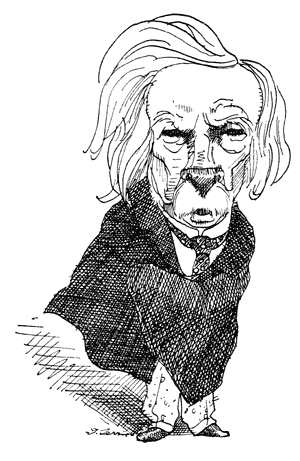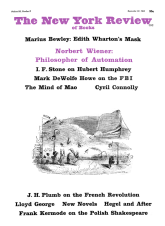Taffy was a Welshman,
Taffy was a thief,
Taffy came to my house,
And stole a leg of beef.
The Welsh have never been popular in England. (Nor, for that matter, have the English exactly won their way to the hearts of the Welsh.) Perhaps it is not surprising, then, that the greatest Welshman in history should not yet have received his due at the hands of English historians, or the English public generally. For Lloyd George possessed all the qualities which the English find most unsettling in their volatile neighbors on the other side of Offa’s Dyke. He was, to begin with, clever; and although English politicians are allowed to be as intelligent as they please in private, they are expected on public occasions to display a decent intellectual mediocrity. Second, he was unashamedly, almost blatantly devious; and it is one of the axioms of English politics that devious acts must be performed only in an ingenuous and freshfaced manner, accompanied by loud protestations of injured rectitude. Lastly, and most unforgiveably, he was totally irreverent.
The pretense that government is simply a form of service; the concomitant pretense that honors and preferment are bestowed as rewards for merit; the gentlemanly humbug according to which corruption and nepotism are un-English and therefore un-thinkable—in fact, all the decorous fig leaves with which the English upper class has traditionally cloaked its ruthlessness and selfishness from the gaze of the multitude—meant nothing to Lloyd George. He came from a subject people who had been, for centuries, at the receiving end of power; and he knew what power was about. Worse, he was determined to get it. Worst of all, he saw no reason to pretend that his pursuit of it was a gentlemanly game, played, like a village cricket match, with no hope of reward.
This was his real crime, and it was an unforgiveable one. Just how unforgiveable has now been demonstrated anew in Mr. McCormick’s critical biography. Mr. McCormick is presumably not an Englishman himself, but it is clear that he has worked on genteel English newspapers long enough to have absorbed most of the genteel responses of the English establishment. Lloyd George, he tells us (and it is about all he does tell us) did not play the game. He was ruthless, ambitious, and untrustworthy. He made demagogic speeches in which he stirred up class hatred. He consorted with parvenu newspaper proprietors, like Lord Northcliffe and Lord Beaverbrook. He intrigued against poor Mr. Asquith and drove him from power. He had a low opinion of the Generals who led the British Army. He even enjoyed sex—and made little effort to conceal his enjoyment.
All true; and all, no doubt, shocking. But as one ploughs one’s way through Mr. McCormick’s pained and indignant pages, one cannot help wondering what country he has been living in all these years. It may well be the case that Lloyd George’s sexual appetites were exceptionally voracious, though I doubt if they were quite as voracious as Mr. McCormick makes out. But it was not his sexual appetites which led to his fall from power and his long sojourn in the wilderness. What ruined him politically was the widespread belief, earnestly disseminated by the united ranks of the establishment, that he was exceptionally untrustworthy. Instead of examining this allegation critically, Mr. McCormick seems content to take it at its face value.
But in fact the allegation does not stand up. Lloyd George was certainly no Boy Scout. But nor were the men with whom he had to deal. Before the first World War, powerful sections of the Conservative party seemed prepared to countenance armed rebellion in Northern Ireland, as a last desperate hope of driving the Liberals from office. Bonar Law, the leader of the Conservative Party, reached his position as the result of a putsch in which the previous leader, Balfour, was made to walk the plank. Admiral Fisher, the First Sea Lord, was prepared to leak naval secrets to the editor of the Observer in order to provide ammunition for a campaign against his political chiefs. Winston Churchill changed parties twice during Lloyd George’s lifetime, and changed his position inside each of the two parties he belonged to with such frequency that men found it impossible to keep track of the changes. At one moment he was the Tory free trader; at another the Radical social reformer; later, the fire-eating war-lord; then the anti-Bolshevik crusader. Of the leading Liberal and Tory politicians of the time, only one—Austen Chamberlain—always played the game; and as Lord Beaverbrook put it, he “always lost.” The difference between Lloyd George and the others was not that he was wickeder than they, but that they had been to the right schools while he had not.
Advertisement
This, of course, is the point. British politics in the first twenty or thirty years of this century was in a state of upheaval. The traditional party structure collapsed, as Labour slowly fought its way into the citadels of power. The Conservative Party survived, though only just. But the Liberal Party—that amorphous coalition of Whig aristocrats, Gladstonian Radicals, and semi-Fabian collectivists—fell apart under the strain. Lloyd George was in part an agent, and in part a symbol, of the forces which destroyed it. He was a man of the transition, half-way between the middle-class Radicalism of the nineteenth century and the proletarian collectivism of the twentieth: the link, so to speak, between Joe Chamberlain and Ernest Bevin.
This was at once his glory and his tragedy. Doubly an outsider himself, by nationality and by social origin, he responded intuitively to the aspirations of the working class, battering against the insiders in the charmed circle of wealth and power. But although he was able to sympathize with insurgent Labour, he was not of it. His own political base lay among the small farmers of North Wales; and he was never able wholly to transcend the intellectual and political limitations of the people who voted for him, idolized him, and still revere his memory. In one of the most perceptive studies of Lloyd George which has so far been published, the Welsh historian, Dr. Kenneth Morgan, compared him to William Jennings Bryan. And just as Bryan’s Populism failed to provide a satisfactory home for the industrial masses of the North-East, so Lloyd George’s Liberalism failed, in the end, to satisfy the Labour movement in Britain.
But it is far from clear that the failure was inevitable. The comparison with Bryan, though illuminating, should not be pushed too far. Lloyd George was a far abler man than Bryan, with infinitely more solid achievements to his credit. His social policies before the first World War did, after all, lay the foundations of the modern welfare state. In the Twenties he was one of the few leading politicians in this country who grasped something of what Keynes was driving at. There is some evidence, moreover, that before 1914 he was beginning to feel his way towards an outright coalition with Labour. Even if no such coalition had come into existence, it is conceivable that he would have been able, almost indefinitely, to take the wind out of Labour’s sails with further installments of social reform. If he had succeeded, the Liberal Party might have remained the major progressive party in Britain to this day.
What made this impossible was, of course, the 1914-18 war. It is here, it seems to me, that the real charge against Lloyd George must be made. Looked at solely in the context of the war, his intrigues against Asquith in 1916 were surely justified, in spite of Mr. McCormick’s pious disapproval. In spite of his great qualities, Asquith undeniably lacked the ruthlessness and drive without which the war might not have been won. If victory in war was to be the only consideration that counted, Asquith had to go; and if Asquith had to go, Lloyd George alone could replace him.
But in fact, victory in war should not have been allowed to dominate all other considerations. The problems of the peace which was to follow should also have weighed in the balance. By driving Asquith out in the way that he did, and with the associates he had, Lloyd George dug his own grave as a progressive leader. For Asquith was destroyed by an unholy alliance composed of Lloyd George and some of the most reactionary elements in the Conservative Party. And once he had entered that alliance, Lloyd George had bound himself hand and foot to the very forces against which the Labour movement would be bound to struggle once the war was over. After 1916 there was no going back. He became the prisoner of the Conservative Party; and once the Conservatives had no further use for him, he was thrown on the scrap-heap. The tragedy was that the British Left as a whole, and not merely Lloyd George as an individual had to pay the price.
This Issue
September 24, 1964




